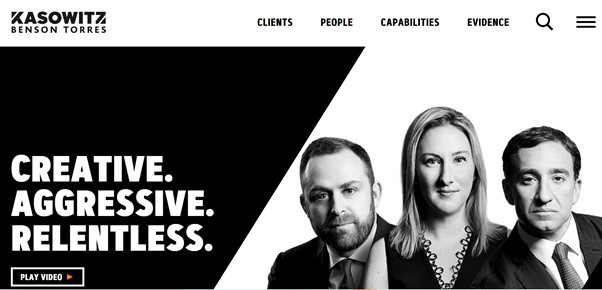I was recently tasked with reviewing the thought leadership output of several hundred law firms in the US and UK for a major client desk research project.
Something that struck me upon clicking through the home pages of site after site after site was how distinctive the first impressions created by most of them seemed to be.
Which is to say: most of them made no distinctive first impression whatsoever.
Many seemed to be identikit. Pictures of lawyers in suits. Heavy use of corporate blue. Blandishments about “focussing on your needs”.
“But we’re different!”
For some reason, identifying and communicating a relevant point of true differentiation seems to be a marketing challenge right across the professional services spectrum.
All Accountancy firms claim to be good at accounting.
All Auditors claim to be good at auditing.
All Actuaries claim to be good at whatever it is that actuaries do.
And that’s just the ‘a’s.
Occasionally in the research, I came across a law firm website proudly proclaiming “We’re a different kind of law firm!” but even then the way in which they claimed to be different seemed to be vague.
I think the problem seems to be that all professional services firms set themselves out as being… well… “professional”.
“Competent”.
Even going so far as being “knowledgeable”.
And indeed the ones with good thought leadership content are at least able to evidence those claims.
But to stand out in professional services, it’s surely no good simply portraying yourself as being “as professional and competent as everyone else”.
Professional competence surely goes with the territory. It’s not a differentiator.
And if your positioning isn’t differentiated in some relevant way from the competition, why would anyone choose your law firm ahead of the others?
Distinctiveness pays
I’ve blogged elsewhere about how any firm marketing itself in a B2B context needs to have a proposition that is:
(i) Relevant to the target audience
(ii) Distinctive from what the competition are claiming, and
(iii) Credibly true
Most professional services company propositions I’ve seen tend to fall down at (ii) – in part, I suspect because they believe what they do and how they do it isn’t especially distinctive from their competitors.
Which is a shame, because when a company can find itself a distinctive positioning, there’s a lot of business to be had.
However a couple of law firms’ positioning stood out for me, and were all the more memorable for it. I’d be interested in what you think.
Creative. Aggressive. Relentless. Us?

In the US, I came across Kasowitz Benson Torres.
Visit their website and the home page greets you with three bold, stark words that Kasowitz claim embody their ethos:
“Creative. Aggressive. Relentless.”
Now I get that not everyone looking for a law firm will want one that is creative or aggressive or relentless. Indeed I rather suspect that the more conservative senior partners in many law firms (that is to say: most of them) would recoil at the thought of claiming to have any of those attributes.
But that’s not the point: Kasowitz Benson Torres aren’t trying to be all things to all clients.
Many potential clients might shy away at the very thought of aggression. But if you’re a New York property developer with a big union problem, or a Manhattan socialite seeking a highly remunerative divorce, a self-professed creative, aggressive and relentless attorney might be exactly what you are looking for. In which case Kasowitz will stand out from the rest.
Professor Mark Ritson often talks about strategic targeting as being as much about who you consciously decide NOT to target, as much as who you decide you ARE going to try and reach.
Distinctive propositions can be polarising, but they can also be highly compelling in a sea of competitor blandishments, especially in professional services.
Easy. ‘Langleasy’, even.

Langleasy image and case study via…Gasp! and Lee Grunnell
That said, a distinctive positioning doesn’t need to be as “balls-out” as the Kasowitz example above in order to be effective if it’s well-executed and communicated consistently.
Up until very recently (prior to them being swallowed up by Knights Solicitors) the UK law firm Langleys had a strong positioning that caught my eye.
The proposition that united Langleys marketing communication was that Langleys were “easy to deal with”.
“Langleasy”, if you will…
Now at first glance, a law firm that claims to be “easy to deal with” might not strike you as having a particularly compelling, differentiated proposition.
However I’d ask you to cast your mind back to the ads that Volkswagen ran for several decades in which they owned the idea that their cars were ‘reliable’.
VW didn’t sell on price (heaven forbid any marketer sells on price). It didn’t sell on speed. Or power. Or fuel economy. Or comfort.
It simply focussed on owning a simple virtue that VW knew most car buyers sought in a car, at a time when no other car manufacturer sought to own that position: reliability.
VWs weren’t the only reliable cars on the market at the time by any means.
But by majoring on a core value; dramatizing it in an engaging way; investing in that positioning consistently over time and then integrating that positioning into everything they communicated, VW were able to “own” the idea of reliability, and have that value irrevocably associated with their brand.
The fact that their sales didn’t permanently evaporate in the wake of the subsequent emissions scandal is probably testament to the power of strong, consistent branding.
I think the Langleasy positioning attempted to do something similar in the world of law firms.
I don’t claim to have conducted the campaign research but I suspect that many people they’d have spoken to would profess to find the law complex and are often at a point of distress when they need a lawyer (let’s face it, no one engages a law firm to pass the time).
Not only that, many people might find the idea of actually having to deal with a lawyer as intimidating as having to deal with…well, a car salesman.
So a law firm that consistently, proudly positions itself as being easy to deal with when none of their rivals are explicitly owning that territory is likely to be more salient in the prospect client’s mind than another that blandly claims to be “local” or “personal” or – heaven forbid – “professional”.
VW evidenced their reliability positioning by the fact that service intervals on their cars were generally twice those on their direct competitors. I never used Langleys Solicitors before the Knights buyout, but would expect that there was something about their client-onboarding process that made dealing with them less intimidating than dealing with a typical law firm might be.
Creative? Aggressive? Relentless? Us?
In theory, it ought to be really easy to stand out from the competition when so many of the competition are claiming the same territory in the same tired old ways.
Yet few professional services firms seem to be bold enough to do this.
Why do you think this is?
Is it in the conservative nature of professional services firms? Do professional services partners only sign off marketing comms that hold up a mirror to themselves and how they want to appear – rather than reflecting their clients and what their clients actually need?
Or are professional services firms really all much-of-a-muchness, trading on little more than personal relationships and client inertia?
I’d genuinely be interested to know what you think – please feel free to comment.
Simon Hayhurst
Hayhurst Consultancy
April 2022
